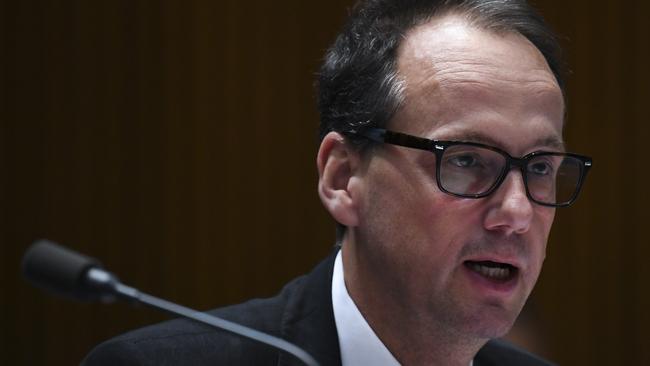ASIC Deputy chair Karen Chester says moving fast to redress ‘failures’
ASIC deputy chair Karen Chester has voiced her frustration over a $3.6bn build-up of remediation payments owed to bank customers.

ASIC has blamed large financial institutions for a build-up of $3.6bn in undistributed remediation payments, saying many had failed to invest in the required systems and processes.
Deputy chair Karen Chester told the regulator’s oversight committee that ASIC was monitoring 88 remediations as of last month, with $1.37bn so far returned to consumers.
“But we’re waiting for a further $3.6bn to go out the door. We’re very frustrated,” Ms Chester said.
Some committee members suggested ASIC itself was to blame because banks felt they had to drill down into the fine details of each case and spend an enormous amount of money on lawyers and consultants.
Ms Chester agreed that was the approach of many institutions.
“But I reject completely that is because of the laws and regulations; that is their commercial choice,” she said.
“The draft regulatory guidance we have put out is designed to give them confidence that they can make assumptions and use formulas so they don’t need to spend hundreds of thousands of dollars on lawyers and consultants to get a precise answer.
“But in doing that, they have to err on the side of generosity. So it’s their commercial choice not to do that; it’s not ASIC.”
The regulator, she said, would not litigate against an institution which had made an honest mistake but had properly invested in its systems and erred on the side of generosity.
ASIC’s policy was not to pursue “process breaches”.
However, if breaches occurred because of under-investment in systems and data analytics, and noone was picking them up, it became a “vicious cycle” of non-compliance.
“So we’re hoping for a severance; a break in the cycle where boards invest in the systems,” Mr Chester said.
ASIC’s frustration with the slow pace of remediation by banks and other financial services companies led to the publication of a consultation paper on the subject last December.
Responses closed last month.
In the discussion paper, ASIC said it had overseen hundreds of remediations, both large and small, in the financial services sector, including the fees-for-no-service scandals featured in the Hayne royal commission.
It said some licensees saw remediations as a distraction from their core businesses, while others took a legalistic approach which neglected consumer interests or failed to prioritise or resource the process.
In such cases, consumers potentially suffered twice - first through the initial actions by the licensee that caused them loss, and then through remediations which failed to prioritise their interests.
In other evidence, commissioner Danielle Press vowed to take action against industry superannuation funds as well as retail funds “without fear or favour”.
The industry funds emerged relatively unscathed from the royal commission, with responsibility for most of the sector’s wrongdoing sheeted home to the for-profit sector.
ASIC, however, had taken civil action earlier this month against industry fund REST for misleading or deceptive representations to members, as well as Statewide Super for misleading or deceptive correspondence.
Ms Press said the eight super matters currently in litigation were spread across the sector, in both industry and retail funds.
On Clive Palmer’s continuing advertising campaign against ASIC, which last year laid criminal charges against the businessman, commissioner Cathie Armour said the regulator had not made any comment.
“With legal proceedings underway, we’re limited in the responses we can make to those advertisements,” Ms Armour said.
Ms Chester said there were a lot of “touch points” with ASIC in relation to the Greensill collapse.
They included the division with oversight of managed investment schemes, the regulator’s insurance group, its corporate governance team, and the initial public offering group.
“So we’re looking at all aspects of this across those teams,” the deputy chair said.
“This became an incredibly risky business model.
“When they’re trying to transfer that risk to other parties like insurers, it turns what can be a very effective way for small and medium-sized businesses to manage their cashflows into high-risk management of those cashflows if the entity falls away and all of a sudden you’re without that cashflow management and you’ve got to redo it.
“But also to those who invested in the funds.”
Among the affected groups were those hit by the withdrawal of Greensill services, the investment funds that bought the Greensill securities and marketed them to wholesale Australian investors, and some Australian investment banks involved in promoting a potential IPO for Greensill late last year.
ASIC was currently working hand-in-hand with the Australian Prudential Regulation Authority to get greater comfort about the exposure of insurers which provided credit insurance to the Greensill investment funds.
Ms Chester said ASIC was “agnostic” about the supply chain financing business model.
At one end of the spectrum, it was a fee-for-service model.
At the other end, however, the model became much more complex and risky, like with Greensill.






To join the conversation, please log in. Don't have an account? Register
Join the conversation, you are commenting as Logout